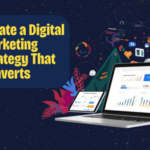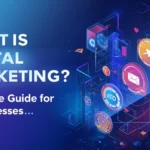Introduction: Impact of AI on Digital Marketing Strategies
In the rapidly evolving digital marketing landscape, staying ahead of the curve is crucial for businesses seeking to thrive in the digital era. Artificial intelligence (AI) is one of the most revolutionary engines driving this evolution. From personalized customer experiences to data-driven insights, AI has reshaped the way marketers approach their strategies. In this article, we will delve into the profound impact of AI on digital marketing, exploring its various applications and how businesses can harness its potential for unprecedented success.
I. Personalization Revolution:
One of the key contributions of the impact of AI on digital marketing is its ability to deliver highly personalized experiences for consumers. To customize information and recommendations, AI systems examine enormous volumes of data, including user behavior, preferences, and demographics. This personalization enhances customer satisfaction and significantly increases the chances of conversion.
- Predictive Analytics:
The impact of AI on digital marketing-powered predictive analytics plays a pivotal role in anticipating consumer behavior. By analyzing historical data, AI algorithms can predict future trends and behaviors, enabling marketers to proactively adjust their strategies. This empowers businesses to stay agile in a dynamic market, making data-driven decisions that align with evolving consumer expectations.
- Dynamic Content:
AI-driven personalization extends to content creation and delivery. Through machine learning, marketers can dynamically adjust website content, email campaigns, and advertisements based on user interactions. This ensures that each customer receives content that resonates with their interests and preferences, fostering a deeper connection between the brand and the consumer.
II. Enhanced Customer Engagement:
The impact of AI on digital marketing technologies has revolutionized customer engagement strategies, offering innovative solutions to connect with audiences in more meaningful ways.
- Chatbots and Virtual Assistants:
Chatbots and virtual assistants powered by AI have become integral components of customer support and engagement. These intelligent systems can provide real-time responses to customer inquiries, offering personalized assistance and enhancing the overall user experience. Not only does this increase client happiness, but it also frees up human resources for more complex tasks.
- Voice Search Optimization:
As voice search continues to gain popularity, AI-driven technologies play a crucial role in optimizing content for voice queries. Natural language processing (NLP) algorithms enable search engines to better understand and respond to voice commands, influencing SEO strategies and content creation for a more conversational and user-friendly approach.
III. Precision Targeting and Retargeting:
AI has redefined the way businesses target and retarget their audiences, optimizing advertising efforts for maximum Impact of AI on digital marketing.
- Programmatic Advertising:
AI-driven programmatic advertising automates the buying and placement of ads in real time. This enables marketers to reach their target audience more efficiently by analyzing user behavior and adjusting ad placements accordingly. Programmatic advertising enhances the precision of targeting, optimizing ad spend, and increasing the likelihood of conversion.
- Retargeting Strategies:
Through AI algorithms, marketers can implement sophisticated retargeting strategies. By analyzing user behavior and engagement data, AI identifies opportunities to re-engage with potential customers through personalized content and advertisements. This strategic approach helps businesses stay top-of-mind and nurture leads through the customer journey.
IV. Data-Driven Decision Making:
AI empowers marketers with unparalleled access to data insights, enabling data-driven decision-making processes beyond human capabilities.
- Marketing Analytics:
AI-driven analytics tools provide marketers with comprehensive insights into campaign performance, customer behavior, and market trends. By processing large datasets at high speeds, AI identifies patterns and correlations that may go unnoticed by traditional analytics methods. This data-driven approach allows marketers to refine strategies, allocate resources more effectively, and optimize ROI.
- Customer Segmentation:
AI algorithms excel at analyzing diverse datasets to identify distinct customer segments based on behavior, preferences, and demographics. This granular level of segmentation allows marketers to tailor their strategies to specific audience groups, delivering more relevant and targeted campaigns. The result is increased engagement and conversion rates as marketing efforts resonate more effectively with each segment.
Artificial Intelligence
As we navigate the ever-evolving landscape of digital marketing, embracing the transformative power of AI is no longer an option but a necessity. Artificial Intelligence’s Impact on Digital Marketing Strategies is profound, revolutionizing personalization, customer engagement, targeting, and decision-making processes. Businesses that harness the full potential of AI stand to gain a competitive edge, creating more meaningful connections with their audience and achieving unprecedented success in the digital era. As AI continues to advance, its role in shaping the future of digital marketing will undoubtedly be central, paving the way for innovative strategies and unparalleled growth opportunities.
 seolounge
seolounge




